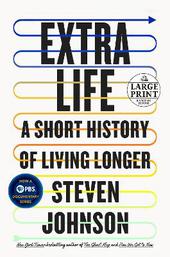
|
Extra Life: A Short History of Living Longer
Paperback / softback
Main Details
| Title |
Extra Life: A Short History of Living Longer
|
| Authors and Contributors |
By (author) Steven Johnson
|
| Physical Properties |
| Format:Paperback / softback | | Pages:486 | | Dimensions(mm): Height 1,Width 1 |
|
| Category/Genre | Self-help and personal development |
|---|
| ISBN/Barcode |
9780593395691
|
| Audience | |
|---|
| Edition |
Large type / large print edition
|
|
Publishing Details |
| Publisher |
Random House USA Inc
|
| Imprint |
Bantam Dell Publishing Group, Div of Random House, Inc
|
| Publication Date |
1 August 2021 |
| Publication Country |
United States
|
Description
As a species we have doubled our life expectancy in just one hundred years. All the advances of modern life--the medical breakthroughs, the public health institutions, the rising standards of living--have given us each about 20,000 extra days on average. There are few measures of human progress more astonishing than our increased longevity, and yet it's easy to overlook. This book is Steven Johnson's attempt to understand where that progress came from. How many of those extra 20,000 days came from vaccines, or the decrease in famines, or seatbelts? What are the forces that now keep us alive longer? Behind each breakthrough lies an inspiring story of cooperative innovation, of brilliant thinkers bolstered by strong systems of public support and collaborative networks. But it is not enough simply to remind ourselves that progress is possible. How do we avoid stalling out in the advance of life expectancy as we face new challenges and old fixes start to fail? What current technologies or interventions that could reduce mortality further are we somehow ignoring? A study in how meaningful change happens in society, this book is an ode to the enduring power of common goals and public resources. The most fundamental progress we have experienced over the past few centuries has not come from big corporations or startups. It has come, instead, from activists struggling for reform; from university-based and publicly funded scientists sharing their findings open-source-style; and from non-profit agencies spreading new innovations around the world.
|